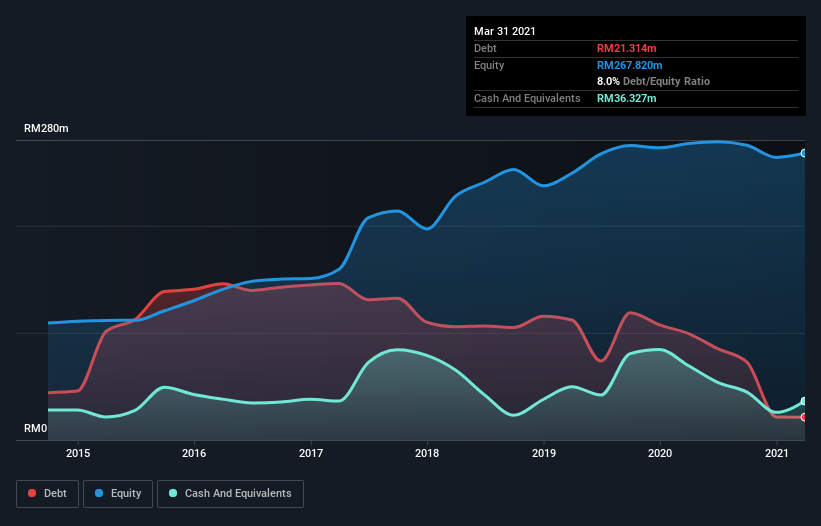- Malaysia
- /
- Real Estate
- /
- KLSE:SKYGATE
These 4 Measures Indicate That Ewein Berhad (KLSE:EWEIN) Is Using Debt Reasonably Well
Legendary fund manager Li Lu (who Charlie Munger backed) once said, 'The biggest investment risk is not the volatility of prices, but whether you will suffer a permanent loss of capital.' So it seems the smart money knows that debt - which is usually involved in bankruptcies - is a very important factor, when you assess how risky a company is. As with many other companies Ewein Berhad (KLSE:EWEIN) makes use of debt. But the more important question is: how much risk is that debt creating?
When Is Debt Dangerous?
Generally speaking, debt only becomes a real problem when a company can't easily pay it off, either by raising capital or with its own cash flow. Part and parcel of capitalism is the process of 'creative destruction' where failed businesses are mercilessly liquidated by their bankers. However, a more usual (but still expensive) situation is where a company must dilute shareholders at a cheap share price simply to get debt under control. Having said that, the most common situation is where a company manages its debt reasonably well - and to its own advantage. When we examine debt levels, we first consider both cash and debt levels, together.
View our latest analysis for Ewein Berhad
What Is Ewein Berhad's Debt?
As you can see below, Ewein Berhad had RM21.3m of debt at March 2021, down from RM99.3m a year prior. However, it does have RM36.3m in cash offsetting this, leading to net cash of RM15.0m.

How Healthy Is Ewein Berhad's Balance Sheet?
We can see from the most recent balance sheet that Ewein Berhad had liabilities of RM78.0m falling due within a year, and liabilities of RM24.5m due beyond that. Offsetting this, it had RM36.3m in cash and RM84.5m in receivables that were due within 12 months. So it can boast RM18.4m more liquid assets than total liabilities.
It's good to see that Ewein Berhad has plenty of liquidity on its balance sheet, suggesting conservative management of liabilities. Because it has plenty of assets, it is unlikely to have trouble with its lenders. Succinctly put, Ewein Berhad boasts net cash, so it's fair to say it does not have a heavy debt load!
In fact Ewein Berhad's saving grace is its low debt levels, because its EBIT has tanked 58% in the last twelve months. Falling earnings (if the trend continues) could eventually make even modest debt quite risky. There's no doubt that we learn most about debt from the balance sheet. But you can't view debt in total isolation; since Ewein Berhad will need earnings to service that debt. So when considering debt, it's definitely worth looking at the earnings trend. Click here for an interactive snapshot.
Finally, a company can only pay off debt with cold hard cash, not accounting profits. While Ewein Berhad has net cash on its balance sheet, it's still worth taking a look at its ability to convert earnings before interest and tax (EBIT) to free cash flow, to help us understand how quickly it is building (or eroding) that cash balance. During the last three years, Ewein Berhad produced sturdy free cash flow equating to 74% of its EBIT, about what we'd expect. This cold hard cash means it can reduce its debt when it wants to.
Summing up
While it is always sensible to investigate a company's debt, in this case Ewein Berhad has RM15.0m in net cash and a decent-looking balance sheet. The cherry on top was that in converted 74% of that EBIT to free cash flow, bringing in RM67m. So we are not troubled with Ewein Berhad's debt use. The balance sheet is clearly the area to focus on when you are analysing debt. But ultimately, every company can contain risks that exist outside of the balance sheet. For instance, we've identified 4 warning signs for Ewein Berhad that you should be aware of.
At the end of the day, it's often better to focus on companies that are free from net debt. You can access our special list of such companies (all with a track record of profit growth). It's free.
If you’re looking to trade a wide range of investments, open an account with the lowest-cost* platform trusted by professionals, Interactive Brokers. Their clients from over 200 countries and territories trade stocks, options, futures, forex, bonds and funds worldwide from a single integrated account. Promoted
New: Manage All Your Stock Portfolios in One Place
We've created the ultimate portfolio companion for stock investors, and it's free.
• Connect an unlimited number of Portfolios and see your total in one currency
• Be alerted to new Warning Signs or Risks via email or mobile
• Track the Fair Value of your stocks
This article by Simply Wall St is general in nature. We provide commentary based on historical data and analyst forecasts only using an unbiased methodology and our articles are not intended to be financial advice. It does not constitute a recommendation to buy or sell any stock, and does not take account of your objectives, or your financial situation. We aim to bring you long-term focused analysis driven by fundamental data. Note that our analysis may not factor in the latest price-sensitive company announcements or qualitative material. Simply Wall St has no position in any stocks mentioned.
*Interactive Brokers Rated Lowest Cost Broker by StockBrokers.com Annual Online Review 2020
Have feedback on this article? Concerned about the content? Get in touch with us directly. Alternatively, email editorial-team (at) simplywallst.com.
About KLSE:SKYGATE
Skygate Solutions Berhad
An investment holding company, engages in the manufacturing, property development and construction, and property management businesses.
Proven track record with low risk.
Market Insights
Community Narratives



